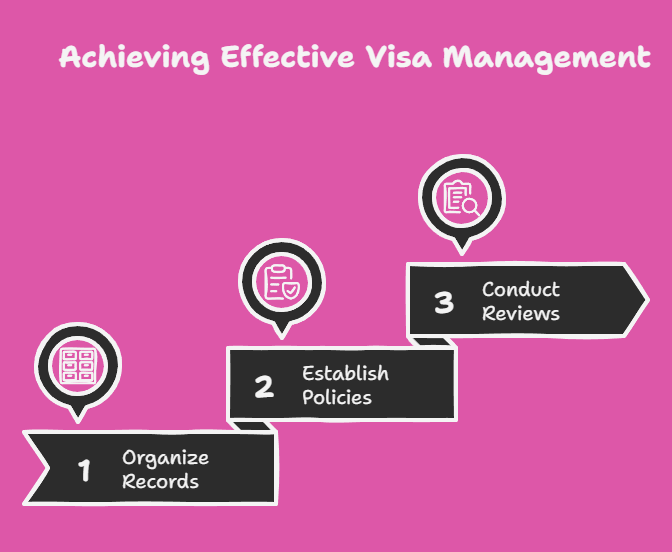Planning to obtain a corporate visa? Know that you must be aware of the steps involved before stepping forward. This makes your corporate visa processing seamless and hassle-free. Understanding requirements, and documentation helps you avoid potential delays. These steps also help you get a clearer view of the visa processing time Dubai applicants typically face.
However, there are several challenges that are a part of the process. Eliminating those challenges will make your corporate visa process easy as pie. This guide aims to explore corporate visa processing by offering insights into the key steps, from common challenges to best practices. You will learn everything that helps you secure the necessary visas efficiently and effectively.
Overview of Corporate Visa Processing:
Corporate visa processing involves steps designed to enable businesses to secure visas who need to work or reside in a foreign country. Typically, the process includes the following key elements:
Firstly, determine the appropriate visa type. This is based on the travel purpose and individual role. Corporate visas include employment visas, intra-company transfer visas, and business visas.
Document preparation is necessary. Must gather and prepare all required documentation. This generally includes:
- Passport copies.
- Employment contracts.
- Company registration documents.
- Proof of business activities, and
- Other supporting materials specific to the visa type and destination country.
Application submission is another mandatory step. Complete and submit the visa application form along with the necessary documents. This involves applying through an embassy, consulate, or online visa portal. It depends on the country’s procedures.
Make sure that all documents comply with the host country’s regulations. From verifying the authenticity of documents to adhering to local labor laws. However, one must meet any specific requirements set by immigration authorities.
At this point, the application undergoes in process by the relevant immigration authorities. This may include background checks, interviews, and additional documentation requests. However, processing times can vary. So, it’s important to factor this into planning. For instance, the UAE visa processing time can shift based on the visa type and applicant volume, making early prep even more essential.
The visa is issued and must be periodically renewed or updated once approved. However, it is based on the visa type and duration. You must be sure to comply with visa conditions and any changes in immigration policies.
Businesses must manage any post-issuance requirements after receiving the visa. The requirements like registering with local authorities, obtaining work permits, or fulfilling regulatory obligations.
Understanding Corporate Visas:
Having corporate visas provides facilitation to the movement of employees, executives, and business partners. They can move across borders for work-related purposes. Corporate visas ensure that individuals can legally work, and manage. Also, they can collaborate within a foreign country while adhering to local immigration laws.
Types of Corporate Visas
Heading towards your journey to obtain a corporate visa? You must know that there are several types of corporate visas. We have discussed them here in detail:
Employment Visas:
The employment visas are issued to individuals. The ones who are employed by a company in the host country. Typically, this visa type is tied to a specific job role and employer. It requires proof of employment and compliance with local labor laws.
Intra-Company Transfer Visas:
This visa type is designed for employees transferred from a:
- Company’s branch
- Subsidiary, or
- Affiliate in one country to a branch in another.
This facilitates the movement of key staff members with specialized knowledge or management roles.
Business Visas:
The business visa is granted to individuals traveling for business purposes. It includes meetings, conferences, or short-term projects. Usually, business visas are short-term. They do not permit long-term employment in the host country.
Investor Visas:
The investor visa is available to individuals who invest a substantial amount of money in a business or property in the host country. Often, investor visas grant residency. It also allows the individual to manage their investment.
Partner Visas:
Issued to business partners or shareholders who are involved in the operation or management of a business entity in the host country. These visas enable partners to oversee and contribute to the business’s activities.
Key Stakeholders Involved
Below are the key stakeholders involved in corporate visa:
Applicant:
The individual seeking the visa. The applicant is the one who provides the necessary documentation. The documents must adhere to application procedures. It must meet the visa requirements.
Employer or Sponsor:
The organization/entity that sponsors the visa application. They are responsible for providing:
- Employment details
- Business information, and
- Fulfilling sponsorship obligations.
Immigration Authorities:
The government agencies are responsible for processing visa applications, verifying documentation, and enforcing immigration laws. Ensuring compliance with the host country’s regulations.
Visa Consultants or Legal Advisors:
Visa consultants/legal advisors are professionals who assist with the visa application process. They offer guidance on requirements, and prepare documentation. They also handle communications with immigration authorities.
Local Authorities:
Depending on the country, local government agencies may be involved in additional registration or compliance requirements once the visa is issued.
Initial Steps in Visa Processing
The initial steps in visa processing involve assessment of the visa requirements and thorough pre-application preparation. Begin by identifying the appropriate visa type. It is based on your purpose of travel, eligibility criteria, and documentation needed. However, gathering and organizing all required documents is necessary. Complete the application form accurately, and schedule any necessary appointments or interviews. This foundational preparation is crucial for a smooth and efficient visa application process. This lays the groundwork for managing the visa process UAE authorities have in place, minimizing surprises along the way. It also helps to avoid delays and ensure compliance with all regulatory requirements
Assessing Visa Requirements:
This is the very first step in visa processing. Thoroughly assess the specific visa requirements for your destination. This involves determining the appropriate visa type. It must be based on your purpose of travel. It can be employment, business, study, or other reasons.
Thoroughly understanding visa requirements upfront prevents unnecessary back-and-forth and delays later in the application. Carefully review eligibility criteria. This includes:
- Financial requirements
- Job roles, or
- Educational qualifications as well as any specific documentation needed. These requirements help ensure that your application meets all necessary criteria. It reduces the risk of delays or rejections.
Pre-application Preparation
Prepare for the application process, once you’ve assessed the visa requirements. Gather and organize all required documents. This includes:
- Passports
- Photographs
- Proof of financial stability, and
- Any supporting paperwork relevant to your visa type.
Complete the visa application form accurately and thoroughly. Schedule any necessary appointments like visa interviews or biometric data collection. Ensure that you are aware of any application fees and payment methods. Effective pre-application preparation helps streamline the process. This ensures that all documentation is in order. It increases the likelihood of a successful visa approval.
Application Process
The visa application process involves application form submission with all required documents. Documents like passports, photographs, and proof of eligibility are important. You will need to pay the relevant fees after submissions. It varies depending on the visa type and processing speed. Once your application is filed and fees are paid, you can track its status. Check it online or through the appropriate authorities. This aids in staying updated on its progress and addresses any additional requests or requirements.
Filing the Visa Application
The application process begins with submitting your completed visa application. Make sure to submit it along with all required documents. This involves ensuring that every detail is accurately filled out and that all supporting paperwork is included. This can be done either online through a government portal or in person at a consulate or embassy. The exact method depends on the structure of the visa process UAE follows for your specific visa category.
Paying Fees and Charges
Pay the applicable visa fees, once the application is submitted. Fees vary depending on the visa type and the processing time selected. Payment methods may include:
- Credit/debit cards
- Bank transfers, or
- In-person payments at the relevant visa office.
Make sure that you keep a receipt or confirmation of payment for your records.
Tracking the Application Status
Monitor your visa application status to stay informed about its progress after submission. Many jurisdictions offer online tracking systems. Here you can check for updates or changes. Keep track of your application. It helps you stay prepared for any additional requirements or interviews. It’s also the easiest way to stay updated on your visa status in real time.
Common Challenges and How to Overcome Them
We have discussed the common challenges and how to overcome them in detail:
Dealing with Delays and Rejections:
Rejections and delays can disrupt plans and create uncertainty. Make sure that your application is complete, and submitted on time. This helps in overcoming challenges. Double-check all required documents and follow instructions. Seek clarification from the relevant authorities to understand the reasons. Use this feedback to address issues. Work with an immigration consultant to strengthen your application for re-submission.
Navigating Regulatory Changes:
Immigration regulations can change. It complicates the application process. Monitor updates from official immigration sources to stay ahead. Subscribe to relevant news feeds. Engaging with an immigration advisor who keeps abreast of regulatory changes. It can provide valuable insights while ensuring your application complies with the latest requirements. Adapting quickly to new regulations will avoid potential pitfalls and keep your application on track.
Handling Complex Cases:
Complex visa applications can be challenging. Provide comprehensive and well-organized information to manage these effectively. Seek professional advice to navigate the complexities. Address any unusual requirements or circumstances. Expert guidance can help in presenting a clear and compelling case. This increases the chances of a favorable outcome. It minimizes the risk of additional complications.
Dealing with Delays and Rejections
Delays and rejections are common hurdles in the visa application process. Complete your application meticulously with all required documents submitted on time. This aids in mitigating these issues. Familiarize yourself with the processing times.
Stay in contact with the visa authorities to follow up on your application status. Review the reasons provided, if a rejection occurs. Address any issues, and consider reapplying. Doing this ensures you’re not blindsided by changes in visa processing timelines or unexpected requirements.
Navigating Regulatory Changes
Immigration laws and regulations can change. It affects the application process. You must stay informed by regularly checking updates. Check updates from official immigration websites or consult with visa experts. The ones who are knowledgeable about the latest regulatory developments. Adapting to new requirements promptly. Ensure compliance with the most current regulations. It helps in maintaining a smooth application process. It avoids potential issues.
Handling Complex Cases
Some visa applications involve complex situations like high-value investments or intricate family cases. Detailed documentation is crucial in such scenarios. Work with legal experts who can provide tailored advice. Ensure that all aspects of your case are handled correctly. Addressing complexities with expert guidance helps in presenting a strong case. It increases the likelihood of a successful outcome.
Role of PRO Services in Visa Processing
Professional PRO services play a crucial role in simplifying the visa processing experience for businesses and individuals. PROs manage the intricate details of visa applications, ensuring compliance with immigration laws and regulations. They handle the submission of documents. Interact with government agencies, and guide required paperwork. It helps in avoiding common pitfalls and delays. PROs facilitate smoother interactions with immigration authorities. It ensures that applications are complete and correctly filed.
PRO services offer valuable support in managing visa renewals. They’re especially helpful in handling the process of visa renewal in UAE, which can get tricky if documentation lapses. It also helps in tracking application statuses. Address any issues that arise during the process. Their assistance helps businesses.
Stay informed about regulatory changes. Maintain compliance with local requirements. This support reduces administrative burdens. It also enhances the efficiency and accuracy of visa processing. This allows clients to focus on their core activities. All visa-related matters must be handled professionally.
What are PRO Services?
Public Relations Officer Services refer to a range of administrative and governmental liaison functions. It is provided by professionals. The ones who specialize in handling compliance and regulatory processes. In the Middle East, PRO services are essential for navigating bureaucratic procedures. Particularly related to immigration, and business operations.
Typically, PRO services include tasks such as:
- Visa processing
- Document legalization
- Government correspondence, and
- Compliance with local regulations.
They manage the paperwork required for visa applications, work permits, and residency documentation. Your submissions must be accurate and adhere to legal requirements. PROs handle interactions with government agencies. Update clients on regulatory changes. Offer guidance on necessary procedures. It helps businesses and individuals avoid common pitfalls and streamline their operations. PRO services act as intermediaries between clients and governmental bodies. It provides expertise and support to complex administrative processes efficiently.
Benefits of Using PRO Services
There are several benefits of using PRO services:
Expertise and Efficiency:
PRO services offer specialized knowledge in complex regulatory environments. It ensures that all paperwork is completed accurately and with local laws. This helps to streamline the process. While it reduces the likelihood of errors and delays.
Time and Resource Savings:
Businesses can save significant time and resources by outsourcing tasks to PRO professionals. PROs handle tasks such as:
- Visa processing
- Document legalization, and
- Government correspondence
It allows clients to focus on their core activities without getting bogged down by administrative burdens.
Compliance and Risk Management:
PRO services help adhere to local regulations and legal requirements. It minimizes the risk of non-compliance, fines, and penalties. Their knowledge of regulatory changes in managing documentation and submissions maintains compliance and avoids potential legal issues.
Seamless Government Interaction:
PROs act as intermediaries between clients and government agencies. It facilitates smooth and efficient communication. By doing so, your applications are processed promptly. Any issues from authorities are handled effectively.
Customized Support:
PRO services provide tailored solutions. It is based on the specific needs of clients. Whether it’s managing visa applications for employees or streamlining the UAE employment visa process, PROs make sure every box is checked. They handle company registrations and ensure timely renewals of permits. They also make sure that all regulatory requirements are met according to the client’s needs
Best Practices for Corporate Visa Management:
The best practices for corporate visa management have been discussed here in detail:
Maintain Organized Records:
Efficient visa management starts with well-organized records. You should implement a digital document management system. This helps to keep track of all visa-related paperwork. This includes:
- Applications
- Approvals
- Renewals, and
- Expirations
Structured filing systems and regular backups aid in data accuracy and accessibility. Keeping detailed records helps in quickly retrieving information. It also helps in monitoring visa statuses. With this, you can ensure compliance with legal requirements.
Establish Clear Policies and Procedures:
Develop policies and procedures for visa management. The ones that outline the responsibilities, processes, and timelines for handling visas. Clearly define who is responsible for each step of the visa process. From application to renewal, make sure that these procedures are documented effectively. Regularly update these policies to reflect any changes in immigration laws/company operations.
Conduct Regular Reviews and Updates:
Review and audit your visa management practices. Make sure that they are up-to-date and compliant with current regulations. Schedule routine checks to verify the status of visas, and licenses. Address any potential issues before they become problematic. Stay informed about changes in immigration laws. Adjust your processes to maintain compliance. Avoid any legal or operational disruptions.
Maintaining Organized Records
Keeping organized records is fundamental for effective corporate visa management. All documents related to visas, permits, and licenses must be filed and easily accessible. Use digital tools and databases to store copies of critical paperwork, and manage renewals. This helps prevent lost documents. It reduces administrative errors. Ensuring all necessary information is readily available when needed.
Establishing Clear Policies and Procedures
Develop clear policies for visa management within your organization. Define responsibilities for staff involved in visa processes. This creates step-by-step guidelines for handling applications and compliance checks. Communicate these policies to relevant teams. Provide training to ensure that everyone understands the requirements. Consistent adherence to these policies helps streamline the process. While it reduces the risk of oversight or non-compliance.
Regular Reviews and Updates
Review and update your visa management practices regularly. Stay aligned with changing regulations and organizational needs. Schedule periodic audits to assess the accuracy of your records. Stay informed about any changes in immigration procedures. Adjust your policies as needed to ensure ongoing compliance. Regular updates help address potential issues proactively.
Case Studies and Success Stories
A leading multinational corporation faced challenges with visa processing for its expanding international workforce. The company implemented a digital visa management system provided by KPM PRO. We integrated real-time tracking, automated alerts, and reporting tools. The company achieved a 40% reduction in processing time and minimized errors. This was achieved by centralizing all visa-related information and automating routine tasks. Our efficient approach expedit visa approvals while ensuring on-time Visa Requirements without interrupting operations. We also provide you with improved overall compliance and reduced administrative overhead. It allows the company to focus on its global expansion efforts with greater confidence.
Examples of Successful Visa Processing
Numerous organizations have achieved significant success. It was done by implementing robust visa management strategies. A multinational corporation streamlined its visa processing by adopting an integrated digital platform. This allows for real-time tracking and automated notifications. The approach led to a 30% reduction in processing time and a notable decrease in compliance issues. It enhances operational efficiency across its global offices.
Likewise, a fast-growing tech startup managed its expansion into new markets by working with a specialized PRO service provider. This partnership ensured timely visa approvals for key talent and smooth entry into new regions. It facilitates rapid business growth and market penetration.
Common Pitfalls to Avoid
There are common pitfalls in visa processing that can hinder success. One major issue is the failure to stay updated with changing immigration regulations. It can result in non-compliance and delays. Incomplete or inaccurate documentation can lead to rejections. Sometimes it causes additional processing time.
Another common pitfall is poor communication with visa authorities. It can create misunderstandings and further complications. Regular training for staff on visa regulations is a tip to avoid these issues. Invest in reliable document management systems. Maintain open lines of communication with immigration officials and PRO services. This helps in addressing any challenges promptly.
Future Trends in Corporate Visa Processing
The future trends in corporate visa processing include the following:
Integration of Advanced Technology:
The corporate visa processing is being transformed by technological advancements. Automation, artificial intelligence, and machine learning are set to play pivotal roles. They streamline visa applications. AI-driven tools can expedite document review. Must flag potential issues early, and provide predictive insights to manage visa expirations and renewals.
Blockchain technology promises enhanced security in verifying and tracking documents. It significantly reduces fraud and errors.
Evolving Regulatory Landscape:
The regulatory environment for visas and immigration is continually evolving. This happens in response to economic shifts, political changes, and international agreements. Future trends will see more dynamic and complex regulations. It requires companies to stay agile and informed. Businesses need to invest in systems that can quickly adapt to new laws and policies. Stay updated with changes in immigration rules and leverage compliance tools. It offers real-time updates and integration with regulatory changes. This in turn ensures continuous adherence and minimizes risks.
Impact of Technology
The future of corporate visa processing is being shaped by advancements in technology. Automation and artificial intelligence are increasingly integrated into:
- Visa management systems
- Streamlining application processes, and
- Reducing manual errors
Digital platforms can provide real-time updates, predictive insights, and automated compliance checks. Blockchain technology is also emerging as a potential solution. This helps in secure and transparent document verification. The technological innovations are expected to enhance efficiency and speed up processing times. While it provides more accurate management of visa-related tasks.
Evolving Regulatory Landscape
The regulatory landscape for visas and immigration is becoming dynamic and complex as global mobility continues to grow. Governments are updating policies to address changing economic conditions, security concerns, and international agreements. Companies need to stay agile and adaptable to navigate these evolving regulations. This includes investing in systems that can integrate new legal requirements. The visa management strategies must be flexible enough to accommodate regulatory changes. Proactive engagement with immigration experts will be essential for maintaining compliance. It optimizes visa processing in this rapidly changing environment.
Conclusion
In conclusion, the complexities of corporate visa processing require a strategic approach. It also needs a thorough understanding of regulatory requirements and operational needs. By leveraging advanced technology, businesses can streamline application processes and enhance efficiency. It is essential to stay informed about evolving regulations. Maintaining organized records is crucial for ensuring compliance and avoiding potential pitfalls. Collaborating with experienced PRO services can also provide valuable support in managing these complexities. This ensures smooth interactions with immigration authorities. An informed approach to visa processing will facilitate global operations. It also supports organizational growth and stability in an increasingly interconnected world.
FAQs:
What is corporate visa processing?
Corporate visa processing is the procedure companies follow to obtain residency visas for their employees in the UAE. It ensures employees can legally live and work while complying with immigration and labor regulations.
Why is corporate visa processing important for businesses?
It allows businesses to legally employ staff, sponsor employees’ families, and maintain compliance with UAE labor and immigration laws. Proper processing avoids fines, penalties, and visa cancellations.
Which employees require a corporate visa in the UAE?
All foreign employees working for a UAE-registered company need a corporate visa. This includes full-time staff, managerial positions, and sometimes contractual or specialized workers, depending on company policy and licensing.
What are the common challenges in corporate visa processing?
Challenges include delays in documentation, incomplete or incorrect applications, meeting MOHRE and immigration requirements, processing multiple visas at once, and coordinating with banks for Emirates ID issuance.
How long does the corporate visa process take in the UAE?
The process typically takes 2–6 weeks, depending on employee nationality, completeness of documents, and the efficiency of the sponsoring company and immigration authorities.
What is the validity of a UAE corporate visa?
Corporate visas are generally valid for 2–3 years, depending on the company type, employee role, and visa category. They are renewable before expiry.
What’s the difference between a corporate visa and a freelance visa?
Corporate Visa: Sponsored by a company, allows employees to work only for that employer, can sponsor dependents.
Freelance Visa: Issued to individuals for independent work, allows multiple clients but typically does not offer full family sponsorship unless combined with a separate visa category.







